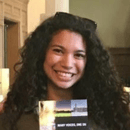***Disclaimer: The author is speaking from personal experience and is in no way trying to self-diagnose themselves with, represent, or portray clinical depression.
If you ever feel like you are in a crisis and having thoughts of harming yourself or others, please reach out to someone you trust or call the National Suicide Prevention Lifeline at 1-800-273-8255.
“I’m afraid,” I say to my therapist, my nails pressed into her yellow Playdoh. It’s my makeshift stress-ball. I like the smell of it on my hands. “I’m afraid that I’ll move backwards, that I’ll end up back in the place I once was without knowing how I got there.”
Her office is lovely in a suspicious sort-of way. We sink into plush couch chairs, and there is more than one flowery tissue box sitting on the small table next to us. (She’s learned how fast I run through them and has only made the mistake once of buying just one box.) It’s a cozy and warm room, if you can forget the camera on her desk blinking its blue eye as it watches us. Most of the time, I do.
My therapist says something back. Like, ups and downs are natural. Like, mental health is not a linear journey. Like, and if you do? now you know you’ll be strong enough to come back from it. Part of me hears her, and part of me doesn’t. The darkness feels safer, sometimes, than the prospect of hope does.
I leave her office that spring quarter with Playdoh stains on my pants. I want to say goodbye to the blue eye, but I don’t.
Just in case I come back.
I started therapy winter quarter of my freshman year. It was for a sleuth of reasons—anxiety, self-esteem issues, and mood swings, to name a few. The growing pains of my generation, my parents liked to call them, even though they refused to see the stretch marks that had been left behind.
Through work in therapy, though, I got better. I picked up some healthier habits, and I took the time to get back to my roots, to the values and people that were important to me. I stopped getting anxious as much, and I started catching the self-deprecating spirals before they got too far.
It wasn’t Rome, but it was something. It was growth—real, tangible growth—and that, knowing my mental health was capable of change, meant the world to me. I left my therapist’s office with the hope that this summer, even though I wouldn’t have counseling to hold me accountable and school to occupy me, I would be okay. I had been given the tools I could implement in my everyday life, and I had good people that I could reach out to. I was afraid, but I tried not to be. For my past, present, and future selves, when I went back home, I tried to be brave.
What do you do when your worst fear becomes a reality, though? What then?
My summer started out okay. I had an internship I was excited about, and for the first time I had friends that told me they wanted to keep in touch after school got out and meant it. I finally had a break from the studying, the stress, the constant go-go-go mentality. I could breathe again.
Gradually, though, bit-by-bit, the haunts of my bad place got more and more confident rearing their ugly heads back again. Adjusting to life at home again wasn’t as easy as I wanted it to be. I came back unsure of how to navigate family dynamics, the clashes caused by how I had changed and they had not, and what was once not-enough time turned into too-much time. There was too much space in my head to worry, to get anxious, and to find myself caught in negative patterns of thought.
It was a story I already knew about myself; this is how most breaks go.
This time, though, it felt like an all-encompassing failure I couldn’t hide from. I knew what my resources were—had talked it through in therapy—yet the gap between knowing what the answer was and tackling it on my own was somehow too far for me to cross. There were no excuses I could make for myself, no explanations I could come up with for why the task of existing felt like such a burden and an impossibility. I wasn’t patient with my healing process post-therapy because this is the cruel irony of poor self-esteem: you hate hating yourself.
Like past summers, I floated through it without purpose and without meaning, but in denial of such. Instead, I took refuge in and clung to the happy bits of my life like they were water to a person dying of thirst. Because, in a way, it was a matter of survival.
Get through the summer, I told myself. Make it to the first day, and you’ll be okay.
I did, and it is this that I’m proudest of from my summer. I made it partly because I had no other choice, but also partly because I’m a motherf***ing strong person. I got to move into my new dorm, start all my classes, and see all my friends again—all things that made me incredibly, incredibly happy.
And so, I waited for the lost, floating feeling to go away. I waited because I was finally back in an environment with structure and support, and the loss of this had been why I’d been feeling so lost and confused.
Yet—the aimlessness refused to leave me. Instead, I found myself struggling to get out of bed because out of it, I knew I would be filled with the impulse to climb back in. Instead, I was drudging through schoolwork I could once blaze through because I couldn’t concentrate or stop getting distracted. Instead, small tasks like making lunch or taking out the trash were ones I had to mentally prepare myself for. Instead, I was constantly afraid of being alone with myself because I knew that’s when the feeling would infest the inside of my body and mind.
I went on like this for weeks until finally, crying in my car, it dawned on me—what I felt every time I took a break, what had compelled me to start going to therapy in the first place, what had shaped my summer and was still shaping me now—this is what feeling depressed is like.
“I’m depressed,” I say to my therapist, staring at the carpet. It’s ugly, I decide. “And, I think I’ve been holding onto this feeling for a long time.”
The room we meet in has an uncomfortable amount of empty space. Our two chairs are pushed up against one side of the wall, while the table with the tissues is backed up against the other. He hasn’t learned yet that we’re going to be needing more than one box, but he’ll catch on. The camera has a black eye this time, and it’s been perched on the ceiling. The room isn’t spunky or quaint, but that’s okay. It doesn’t have to put me at ease; he’s able to on his own.
My therapist says something back. Like, can you explain what it feels like? Like, that’s brave of you to voice. Or, like silence, because he’s giving me space to say what needs to be said. Part of me hears him, and part of me doesn’t. There’s a freedom in letting go of this shadowy thing, of letting it walk into the light, and I’m trying to relish and bask in the moment.
I leave the room lighter, checking my pockets because it’s strange to be without this burden. I don’t say goodbye to the black eye because I know I’ll be coming back. It’ll see me again, and that’s okay. Being in therapy is a good thing. It means that I’m learning to accept that part of me. I’m learning to forgive myself for needing help from others and struggling to help myself. I’m learning how to live with the highs and lows, instead of pretending they don’t exist. It means that I am far from being the person I want to be, but I have finally found hope again.
And, it feels amazing.



